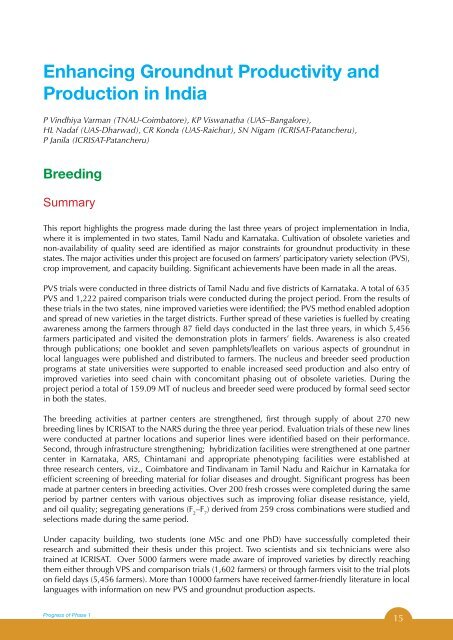Final version of Tropical Legumes II Project Report for Phase 1 - icrisat
Final version of Tropical Legumes II Project Report for Phase 1 - icrisat
Final version of Tropical Legumes II Project Report for Phase 1 - icrisat
You also want an ePaper? Increase the reach of your titles
YUMPU automatically turns print PDFs into web optimized ePapers that Google loves.
Enhancing Groundnut Productivity and<br />
Production in India<br />
P Vindhiya Varman (TNAU-Coimbatore), KP Viswanatha (UAS–Bangalore),<br />
HL Nadaf (UAS-Dharwad), CR Konda (UAS-Raichur), SN Nigam (ICRISAT-Patancheru),<br />
P Janila (ICRISAT-Patancheru)<br />
Breeding<br />
Summary<br />
This report highlights the progress made during the last three years <strong>of</strong> project implementation in India,<br />
where it is implemented in two states, Tamil Nadu and Karnataka. Cultivation <strong>of</strong> obsolete varieties and<br />
non-availability <strong>of</strong> quality seed are identified as major constraints <strong>for</strong> groundnut productivity in these<br />
states. The major activities under this project are focused on farmers’ participatory variety selection (PVS),<br />
crop improvement, and capacity building. Significant achievements have been made in all the areas.<br />
PVS trials were conducted in three districts <strong>of</strong> Tamil Nadu and five districts <strong>of</strong> Karnataka. A total <strong>of</strong> 635<br />
PVS and 1,222 paired comparison trials were conducted during the project period. From the results <strong>of</strong><br />
these trials in the two states, nine improved varieties were identified; the PVS method enabled adoption<br />
and spread <strong>of</strong> new varieties in the target districts. Further spread <strong>of</strong> these varieties is fuelled by creating<br />
awareness among the farmers through 87 field days conducted in the last three years, in which 5,456<br />
farmers participated and visited the demonstration plots in farmers’ fields. Awareness is also created<br />
through publications; one booklet and seven pamphlets/leaflets on various aspects <strong>of</strong> groundnut in<br />
local languages were published and distributed to farmers. The nucleus and breeder seed production<br />
programs at state universities were supported to enable increased seed production and also entry <strong>of</strong><br />
improved varieties into seed chain with concomitant phasing out <strong>of</strong> obsolete varieties. During the<br />
project period a total <strong>of</strong> 159.09 MT <strong>of</strong> nucleus and breeder seed were produced by <strong>for</strong>mal seed sector<br />
in both the states.<br />
The breeding activities at partner centers are strengthened, first through supply <strong>of</strong> about 270 new<br />
breeding lines by ICRISAT to the NARS during the three year period. Evaluation trials <strong>of</strong> these new lines<br />
were conducted at partner locations and superior lines were identified based on their per<strong>for</strong>mance.<br />
Second, through infrastructure strengthening; hybridization facilities were strengthened at one partner<br />
center in Karnataka, ARS, Chintamani and appropriate phenotyping facilities were established at<br />
three research centers, viz., Coimbatore and Tindivanam in Tamil Nadu and Raichur in Karnataka <strong>for</strong><br />
efficient screening <strong>of</strong> breeding material <strong>for</strong> foliar diseases and drought. Significant progress has been<br />
made at partner centers in breeding activities. Over 200 fresh crosses were completed during the same<br />
period by partner centers with various objectives such as improving foliar disease resistance, yield,<br />
and oil quality; segregating generations (F 2<br />
–F 7<br />
) derived from 259 cross combinations were studied and<br />
selections made during the same period.<br />
Under capacity building, two students (one MSc and one PhD) have successfully completed their<br />
research and submitted their thesis under this project. Two scientists and six technicians were also<br />
trained at ICRISAT. Over 5000 farmers were made aware <strong>of</strong> improved varieties by directly reaching<br />
them either through VPS and comparison trials (1,602 farmers) or through farmers visit to the trial plots<br />
on field days (5,456 farmers). More than 10000 farmers have received farmer-friendly literature in local<br />
languages with in<strong>for</strong>mation on new PVS and groundnut production aspects.<br />
Progress <strong>of</strong> <strong>Phase</strong> 1<br />
15
















